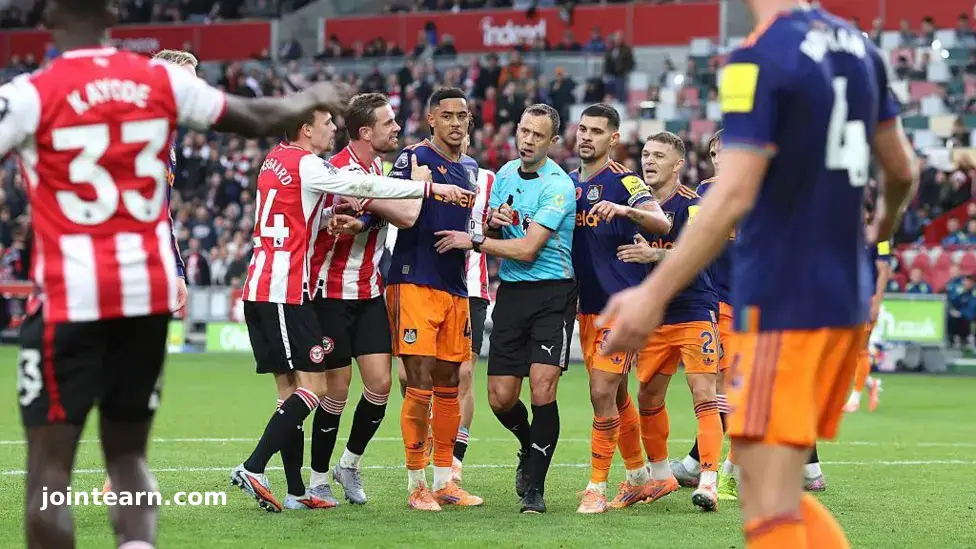
Player behaviour has long been a hot topic for football fans, but despite its prominence among supporters, it wasn’t featured in our Reinventing Football manifesto. Thousands of readers reached out to highlight the key issue they wanted addressed: players harassing referees, attempting to cheat, and showing blatant disrespect on the pitch.
From microscopic offside disputes to handball controversies and excessive time-wasting, the complaints were varied—but the underlying concern was the same: a decline in sportsmanship and respect in professional and grassroots football alike.
So, what steps have football’s governing bodies taken to tackle poor player behaviour, and how effective have these measures been?
Fans Demand Stricter Punishments for Dissent and Simulation
Supporters have made their opinions loud and clear: players who swear at referees, simulate fouls, or try to deceive officials should face immediate consequences. Some notable fan suggestions include:
- Christopher: “Swearing at the referee or using abusive language should result in an immediate red card and a four-match ban.”
- Jeff: “Any attempt to simulate a foul or hold a player’s clothing should lead to a yellow card, ideally monitored by VAR.”
- Dave: “Simulation is rampant. Players go down holding their face or head when barely touched. Cards for this are long overdue.”
Former Premier League referee Chris Foy added context, stating:
“Dissent is a problem at many levels of football. Referees cannot address it alone—everyone involved has a duty to protect the image of the game. Grassroots sin-bins introduced in 2019 were a great step forward.”
The Role of Governing Bodies
We reached out to football authorities—including IFAB, FIFA, UEFA, The FA, the Premier League, and PGMO—to assess what is being done.
IFAB, football’s rule-making body, confirmed that “improving player behaviour and increasing respect for match officials are key topics currently being addressed.”
The FA has introduced policies through the Participant Behaviour Charter (2023/24 season) covering professional football across the Premier League, EFL, National League, and WSL. Early data indicates some success:
- 2023/24: 215 cautions for dissent (0.57 per game)
- 2024/25: 172 cautions (0.45 per game)
- Current season: 33 cautions (0.30 per game)
The FA argues this trend reflects improved player conduct, though critics question whether fewer cautions result from better behaviour or less strict enforcement.
“Captain Only” Rule: Preventing Player Surrounding
A cornerstone initiative has been the “Captain Only” rule, which restricts interactions with referees to team captains. This aims to prevent confrontational gatherings around match officials—a situation often called “surrounding”.
- UEFA trialed the rule during Euro 2024, reporting extremely positive results.
- English football adopted it at the start of the current season. The FA reports an 82% reduction in surrounding incidents compared to last season.
- FIFA’s Pierluigi Collina, a strong advocate, emphasizes that verbal and physical abuse toward referees threatens football at every level.
Tackling Simulation: Diving and Deception
Simulation remains a major concern for fans and officials alike. Premier League surveys highlighted player and supporter frustration over attempts to deceive referees.
- This season: 9 yellow cards issued for simulation across 99 games (0.8 per game), doubling previous seasons’ frequency.
- Retrospective action against simulation remains limited. Players only face penalties if deception results in a penalty, narrowing enforcement.
- Only a handful of Premier League players—like Callum Hudson-Odoi, Joe Willock, and Georginio Rutter—have been booked for simulation after VAR intervention in recent years.
While the FA rule on retrospective action exists, it is seldom applied, leaving certain forms of simulation—like exaggerating contact—largely unpunished.
Grassroots Initiatives: Cooling-Off Periods and Sin-Bins
Controlling behaviour at grassroots levels presents unique challenges, particularly with inexperienced referees. To address this, IFAB and The FA have promoted innovative measures:
- Cooling-off periods: Teams return to their penalty areas while referees mediate with captains and coaches to de-escalate conflicts.
- Sin-bins (temporary dismissals): Players are removed for 10 minutes for abusive words or gestures.
- Body cameras for officials: Activated during threatening situations, deterring inappropriate conduct.
- “Enough is Enough” campaign: Targets hate and verbal abuse across grassroots football.
These initiatives aim to cultivate respect and discipline from the ground up, ensuring the next generation of players values fair play.
Are These Measures Working?
While statistics show a decline in some forms of dissent, the real question remains: has player behaviour genuinely improved, or has enforcement become more lenient?
What is clear is that football authorities are actively pursuing solutions: from stricter punishment policies, captain-led interactions with referees, and technology-assisted enforcement to grassroots campaigns focused on respect and discipline.
Fans, however, remain vocal, pushing for more robust measures, particularly against simulation and disrespect toward officials. The ongoing dialogue between supporters, players, and governing bodies is crucial to ensuring the game remains competitive without compromising fairness and integrity.


Leave a Reply